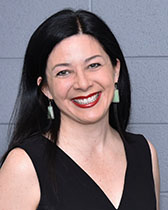Jennifer Lackey
Wayne and Elizabeth Jones Professor of Philosophy
Curriculum Vitae

- j-lackey@northwestern.edu
- Website
- 847-491-2557
- Kresge 3-423
Jennifer Lackey is the Wayne and Elizabeth Jones Professor of Philosophy and Professor of Law (courtesy) at Northwestern University, Founding Director of the Northwestern Prison Education Program, and Senior Research Associate at the African Centre for Epistemology and Philosophy of Science at the University of Johannesburg. Lackey’s research is in social epistemology with a focus on epistemological issues within the American criminal legal system. She is the author of over 60 articles and four books, including her recent Criminal Testimonial Injustice, which won the 2024 North American Society for Social Philosophy Book Award. She is also the editor or co-editor of six volumes, Editor-in-Chief of Episteme and Philosophical Studies, and Subject Editor for the Stanford Encyclopedia of Philosophy. Lackey was elected to the American Academy of Arts and Sciences in 2025, is the winner of the 2024 Humanitas Award, 2023 Horace Mann Medal, and the Lebowitz Prize for Philosophical Achievement and Contribution. She was elected President of the American Philosophical Association’s Central Division from 2021–2022, was named the 2025 holder of the Spinoza Chair at the University of Amsterdam and has received grants and fellowships from the John Simon Guggenheim Memorial Foundation, the Andrew W. Mellon Foundation, the American Council of Learned Societies, and the National Endowment for the Humanities.
Selection of Recent Articles:
- “False Confessions and Testimonial Injustice,” forthcoming in the Journal of Criminal Law and Criminology.
- “The Total Evidence View of the Epistemology of Sexual Consent,” forthcoming in Jennifer Lackey (ed.), Applied Epistemology. (Oxford: Oxford University Press).
- “Punishment and Transformation,” forthcoming in Enoch Lambert and John Schwenkler (eds.), Becoming Someone New: Essays on Transformative Experience, Choice, and Change (Oxford: Oxford University Press).
- “When Should We Disagree About Politics?” forthcoming in Elizabeth Edenberg and Michael Hannon (eds.), Political Epistemology.
- “The Duty to Object,” Philosophy and Phenomenological Research (2018): doi: 10.1111/phpr.12563.
- “Credibility and the Distribution of Epistemic Goods,” in Kevin McCain (ed.), Believing in Accordance with the Evidence: New Essays on Evidentialism. (Springer Publishing, 2018): 145–168.
- “Academic Freedom,” in Jennifer Lackey (ed.), Academic Freedom. (Oxford: Oxford University Press, 2018): 3–20.
- “Silence and Objecting,” in Casey Johnson (ed.), Voicing Dissent: The Ethics and Epistemology of Making Disagreement Public. (Routledge, 2018): 82–96.
- “Group Lies,” in Eliot Michaelson and Andreas Stokke (eds.), Lying: Language, Knowledge, Ethics, Politics (Oxford: Oxford University Press, 2018): 262–284.
- “Experts and Peer Disagreement,” in Matthew Benton, John Hawthorne, and Dani Rabinowitz (eds.), Knowledge, Belief, and God: New Insights in Religious Epistemology (Oxford: Oxford University Press, 2018): 228–245.
- “Group Assertion.” Erkenntnis 83 (2018): 21–42.
- “Norms of Credibility.” American Philosophical Quarterly 54 (2017): 323–337.
- “What Is Justified Group Belief?” The Philosophical Review 125 (2016): 341–396.
Selection of Recent Public Engagement:
- Lecture, “Incarceration and Education.” Chicago Humanities Festival, October, 2019.
- Guest, “Meet the Educator Bringing Liberal Arts to Illinois Prisoners,” WBEZ, October, 2019.
- Lecture, “The Prison Education Paradox.” TEDx, April, 2019.
- “The Measure of a Country Is How It Treats its Prisoners. The U.S. Is Failing.” The Washington Post, February, 2019. bruary, 2019.
- “Natural Born Liars: Why We Spread Lies, and How to Stop.” Psychology Today, December, 2018.
- “True Story: Echo Chambers Are Not the Problem.” Morning Consult, November, 2018.
- Guest, Written Inside: Stories from Inside Prison (with Alex Kotlowitz), WBEZ, April, 2017.
- Guest, Philosophy Talk, Philosophy Behind Bars, February, 2017.
- A Journal Editor’s Wish List. Blog of the APA, October, 2016.
- Pitted Against Yourself: Credibility and False Confessions. Blog of the APA, April, 2016.
- The Irrationality of Natural Life Sentences. The New York Times, The Stone, February, 2016.
